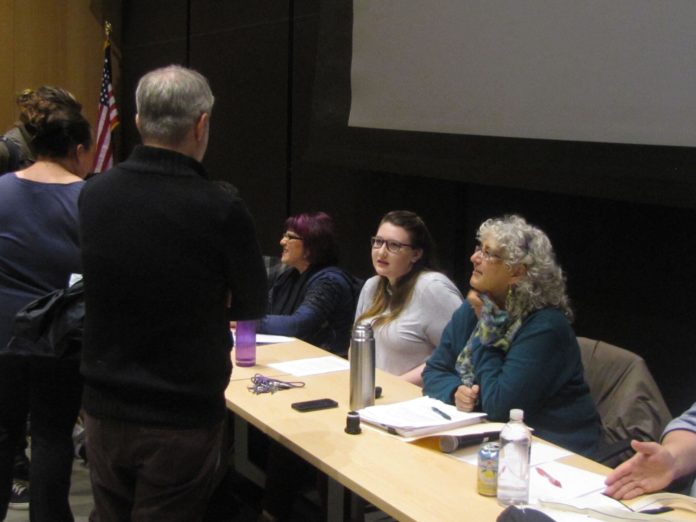Students and faculty came together Thursday night in the Smith Student Center Theater to have a roundtable discussion regarding the current political climate and the role of communication in the matter.
The discussion titled “Creating Constructive Criticism” was put on by the Gender Studies Committee, which is made up of students, faculty and a graduate assistant. Moderated by the Gender Studies Program director, Cindy LaCom, the event brought up questions, insights and solutions.
The panelists included Joseph VanHannak from the Counseling and Development Department, Sharon Sykora from the Political Science Department, Christine Pease-Hernandez from the Communication Department, and Creative Writing and Gender /Diversity Studies student Sara Naughton who offered a millennial point-of-view.
The discussion began with a short clip featuring a compilation of political ads from this election, which has turned into a vast accumulation of unflattering pictures of Hillary Clinton or Donald Trump with irrelevant insults written on them.
The panel summarized how people in today’s society tend to take differences in general very personally. They said the fact that people want to be around others who think like them leads to polarization, and polarization then leads to picking sides and conflict.
“When we view other people as full-thinking dynamic human beings, it is much harder to be hurtful. When we reduce people to labels, it is much easier to throw stones,” VanHannak said.
LaCom explained how people should analyze what feeds such hatred and find ways that we can bring our society back to being civil.
LaCom mentioned how important it is for people to engage with people whose opinions differ from our own. She feels that our society has a dire need for empathy. She offered the idea of how both political parties should listen to the other parties points, rather than insult each other so we can gain political knowledge and efficacy.
Naughton then explained her experience as someone who has grown up with social media being a major part of her life. She explained that in regards to social media, the user has the ability to control who they follow and what views they see. She also pointed out how tweets are only 140 characters or less, making it much easier to tweet insult rather than tweet about political policies.
“I would encourage anyone who has not thought about how we communicate in our lives to do so,” Naughton said. “It relieves so much anxiety.”
VanHannak said how when users post on social media, sometimes a main goal of the post is to get likes and followers rather than share insightful beliefs. VanHannak went on to describe the Gyges effect, which is the way in which the internet encourages communication that simply would not happen face-to-face. Social media users might find themselves sharing things in a way they would never share directly, he said.
Dr. Pease-Hernandez used her communication background to offer ways to make peace and improve communication. She urged the audience to focus on one thing they can agree on with the other political party.
“It is very important that you educate yourself on how to be an effective communicator. It is not something we are born with,” Pease-Hernandez shared.
LaCom speculated that there is a verbal violence occurring in ways that is unmatched historically. Social media and the extremely hostile political climate has brought polarization to a new level, she said.
LaCom challenged the audience to intentionally put themselves in a position where they have to listen empathetically in order to learn more.








